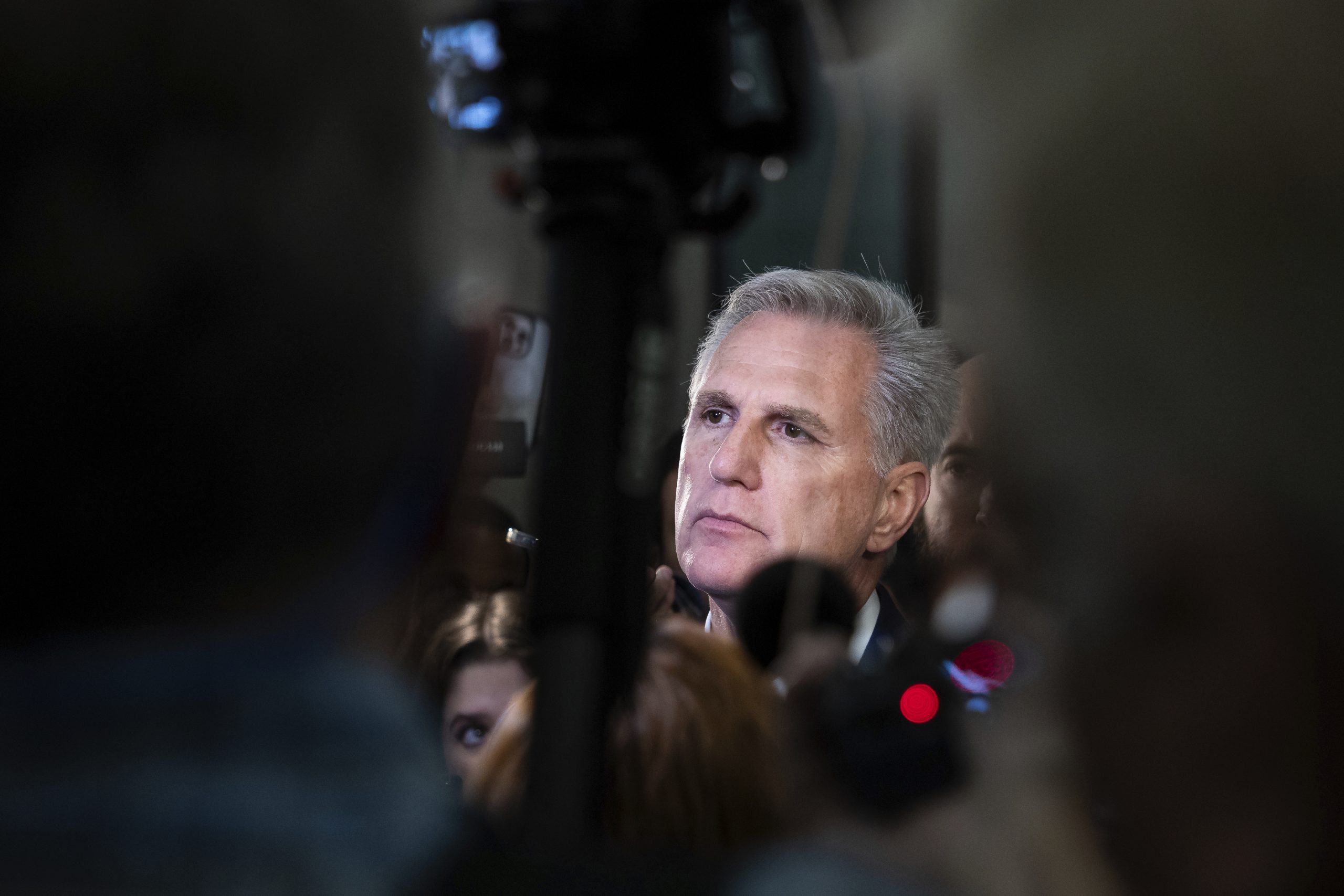House Republicans who want to prevent a handful of their members from evicting another speaker could get help from a surprising group: the eight of them who helped dethrone Kevin McCarthy.
Eager to avoid a repeat of their catastrophic October, Republicans are discussing changing House rules to prevent a single member from forcing a vote to fire the speaker. So far, the entire House GOP — but especially its conservatives — trust Speaker Mike Johnson more than McCarthy.
But the Louisianan already faces many of the same headaches that doomed his predecessor.
There’s a very different mood lately among the hardliners who joined Rep. Matt Gaetz (R-Fla.) to oust McCarthy — or the “evil eight,” as some Republicans now call them. At least half of that group say they are now open to making it harder to boot a speaker, a motion that currently requires just one member to force a vote.
Still, the conference is caught on one question before it can move forward: If the magic number isn’t one, what is it? Suggestions have ranged from over 100 members to just seven, and there’s no sense of much agreement yet. Until that’s settled, it’s unclear when the House GOP would move forward with an adjustment.
Members seem to mostly agree that they shouldn’t continue to allow just one of them the power to cause such bedlam, for both the party and the institution. That’s too risky for many GOP lawmakers, some of whom are still infuriated by the three-week leadership vacuum that resulted after McCarthy’s Oct. 3 firing.
“It served its purpose. We got everybody’s attention, and they understand we mean business,” Rep. Tim Burchett (R-Tenn.) said in an interview, adding that changing the rule isn’t “a beach I’m going to die on.”
The eight who helped oust McCarthy have shown no signs of regret, and none of them have committed outright to changing the rule to “vacate” the speakership. So it’s far from clear that Republicans will ultimately be able to adjust the policy, especially given the significant split on a new threshold and the GOP’s razor-thin majority that requires near unity or help from Democrats.
On one side, Rep. Max Miller (R-Ohio) floated requiring the support of 112 members of either party to trigger a vote on stripping the speaker’s gavel. On the other, Rep. Andy Biggs (R-Ariz.) — one of the eight who voted to oust McCarthy — threw out upping the current threshold from a single member to something like seven.
“The motion to vacate threshold was never my cause in January,” Biggs said in a brief interview, adding that while it “needs to be reasonable and rational so it remains a real tool … maybe one is too little.”

Johnson has indicated that he believes Republicans will be able to change the rule on ousting a speaker. He said during a recent Fox News interview that “everyone has told me that that rule has to change.” But, he added, it’s not his “highest priority” as he tries to reorient the conference to focus on policy ahead of the Nov. 17 government shutdown deadline.
There are already signs of opposition to any changes that could imperil the chances of any changes being enacted. Outside of the group of eight, Republicans like Reps. Chip Roy of Texas and Ralph Norman of South Carolina have warned that they believe the current rule should remain intact. Rep. Bob Good (R-Va.), who voted to oust McCarthy, said he also doesn’t support raising the threshold.
“Every Speaker needs to be held accountable and serves at the pleasure of 218-plus members. However, I also recognize that every House rule can be changed if a majority of members support doing so,” Good said in a statement to POLITICO.
It’s hardly the first time the conference has haggled over what it should take to try to fire a speaker. The House GOP initially voted during a closed-door meeting in November 2022 to require a majority of Republicans to support triggering such a vote — what seemed like a win for McCarthy and his allies, who worried that a lower threshold would hold the bulk of the conference hostage to conservative rabble-rousers.
Republicans then watched that number get whittled down to five, and then ultimately one, as McCarthy cut deals with his opponents in order to get the speaker’s gavel after a grueling 15 ballots in January.
In the wake of McCarthy’s ouster, 45 House Republicans, including Main Street Caucus Chair Dusty Johnson of South Dakota and Republican Governance Group Chair David Joyce of Ohio, circulated a letter calling to increase the threshold. They argued that the conference “must address fundamental changes to the structure of our majority to ensure success for the American people.”
But Johnson could be forced to cut deals with the same group who booted McCarthy if he wants to change the rule without help from Democrats. Gaetz, who orchestrated McCarthy’s ouster, spoke to the Louisianan on the day he won the gavel about changing the motion to vacate rule — but not for free.
“I’m negotiable on measures that will increase the threshold for the motion to vacate while embracing some of the bipartisan reforms that I’ve advanced” with Rep. Ro Khanna (D-Calif.), Gaetz said, pointing to things like term limits, campaign finance reforms and ethics and lobbying changes.

















